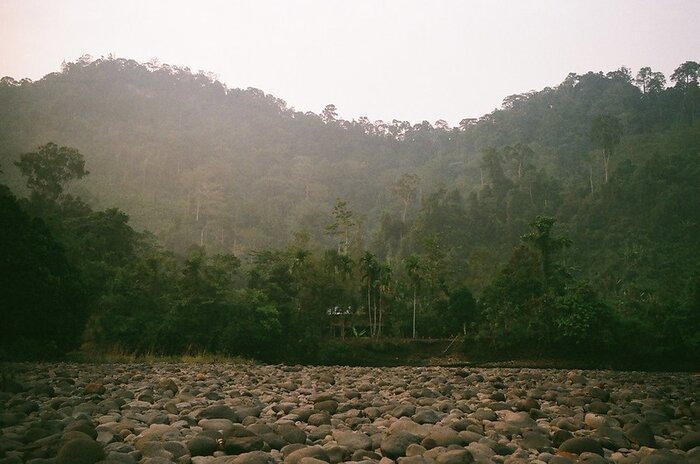
Long Isun Community Pushes for Mediation in Formal Complaint Against World Bank Carbon Project in Indonesia

Long Isun's complaint against the East Kalimantan Project highlights environmental harms and a systemic failure to protect Indigenous rights.
East Kalimantan, Indonesia – November 5, 2025
Members and representatives of the Long Isun Indigenous community have filed a formal complaint against a World Bank Emission Reduction (ER) project in East Kalimantan, Indonesia, asserting violations of their rights to self-determination, land, and Free Prior and Informed Consent (FPIC), and raising concerns over the project’s environmental and social impacts on their customary territory.
The complaint has been filed with support from Pekumpulan Nurani Perempuan, Accountability Counsel, and Forest Peoples Programme.
The concerns centre on the East Kalimantan Project for ER Results (P166244), financed by the World Bank through the Forest Carbon Partnership Facility (FCPF). The Program is intended to reduce greenhouse gas emissions from deforestation and forest degradation, and it includes a Benefit Sharing Plan (BSP) to distribute emission reduction payments.
In the complaint, the Long Isun community asserts that the project has:
- Caused and will continue to cause harm due to discrimination based on their Indigenous status;
- Failed to resolve long-standing land boundary disputes (despite this being one of the project’s stated objectives);
- Created perverse incentives that further delay in the Indonesian government’s formal recognition of Long Isun as a Masyarakat Hukum Adat (MHA, Customary Law Community/Indigenous Peoples); and
- Undermined the principle of FPIC by coercing the community into a tokenistic process that denied Long Isun any genuine opportunity to withhold consent or opt out of the project – while simultaneously claiming emissions reductions from their 80,000 hectare ancestral territory.
“The ER project was supposed to support the resolution of land boundary disputes and accelerate MHA recognition for groups like Long Isun, but these steps were never taken,” said Martha Doq, Director of Perkumpulan Nurani Perempuan.
Impacted communities have requested that the World Bank’s Accountability Mechanism initiate a mediation process with meaningful involvement from local government actors to reach mutually agreed solutions through facilitated dialogue.
Long Isun is also urging the Accountability Mechanism to ensure a commitment from the Government of Indonesia against any form of retaliation against community members resulting from their involvement in this process.
In light of the harms already experienced and the potential harms that will escalate if the Project continues without urgent corrective action, Long Isun is requesting that the World Bank:
- Maintain the suspension of the final disbursement tranche to the Government of Indonesia (USD 89.1 million) until the complaint process concludes.
- Respect Long Isun’s decision to opt out of the Project.
- Cease ER Project activities in Long Isun territory until the resolution of land boundary conflicts and approval of MHA status.
- Recognize harms suffered by Long Isun, including retaliation, intimidation, gender-based harms, and violations of the right to FPIC.
- Revise the Benefit Sharing Plan (BSP) to address structural discrimination and inequities, in line with the substantive inputs from organisations such as PNP and FPP.
- Reform the project to align with a rights-based, Indigenous-led model of conservation.
“The World Bank’s failure to comply with its own safeguard policies and risk assessments is directly contributing to the harms experienced by Long Isun,” said Julio Castor Achmadi, Communities Associate at Accountability Counsel.
One of the most persistent harms has been the long-standing delay in Long Isun’s formal Indigenous recognition, or MHA. In East Kalimantan, only four Indigenous communities have been recognized as MHA, and none of the 50 villages in the district where Long Isun is located have MHA recognition.
For years, the Bank has deferred to the Government of Indonesia’s slow-moving recognition process, and it has failed to monitor or enforce the implementation of any mitigation measures to protect communities like Long Isun from conflict.
“We cannot talk about carbon while our land boundaries are still disputed and our rights remain unrecognized. Without MHA recognition, there will never be a fair or positive outcome for Long Isun,” said Theodorus Tekwan, Long Isun representative.
“Long Isun has sought recognition since 2018 when enabling legislation came into force. It is inexcusable that delays persist. Without formal recognition, their land rights remain vulnerable to dispossession and conflict. As palm oil and mining expand further up the Mahakam, it is imperative that Long Isun be able to determine their own future. This begins with the formal recognition of their status as MHA.” said Angus MacInnes, Forest Peoples Programme
“Recognition of indigenous territories is the first condition for real conservation. Without it, carbon projects like this only strengthen control by corporations and weaken the communities who have protected forests for generations,” said Fathur Roziqin Fen, WALHI Kalimantan Timur.
Contact persons:
Martha, Perkumpulan Nurani Perempuan: +62 8115861244
Hanyang, Perkumpulan Nurani Perempuan: +62 812534833305
Fathur Roziqin Fen, WALHI Kalimantan Timur: +62 811598002
Julio, Accountability Counsel: +62 8999101176
Angus, Forest Peoples Programme: +36 309753212
Signatories:
- Perkumpulan Nurani Perempuan
- Pokja 30
- WALHI Kalimantan Timur
- Accountability Counsel
- Forest Peoples Programme
- Rainforest Action Network
Overview
- Resource Type:
- Press Releases
- Publication date:
- 5 November 2025
- Region:
- Indonesia
- Programmes:
- Global Finance
